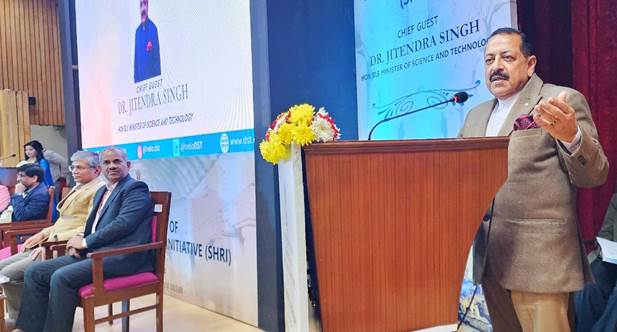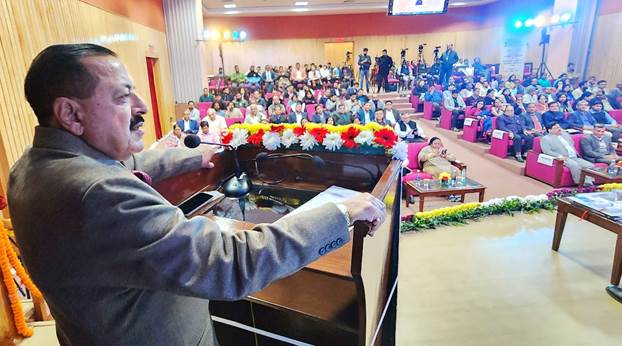New Delhi, Delhi, 16th of December, 2024 : Union Minister of State (Independent Charge) for Science and Technology; Earth Sciences and Minister of State for PMO, Department of Atomic Energy, Department of Space, Personnel, Public Grievances and Pensions, Dr. Jitendra Singh said here today fusion of traditional knowledge with modern technology could give India’s advantage over others.
The Minister underscored the transformative potential of blending India’s ancient wisdom with contemporary scientific innovations while speaking at the celebration of five years of the Science and Heritage Research Initiative (SHRI).
Organized by the Department of Science and Technology, the event celebrated the strides made in preserving and modernizing India’s rich heritage. The Minister highlighted this fusion as India’s unparalleled strength in achieving Prime Minister Narendra Modi’s vision of Viksit Bharat by 2047.
Dr. Jitendra Singh lauded India’s heritage as a treasure trove of knowledge, with nearly 5 million ancient manuscripts, palm-leaf inscriptions, and thousands of historically significant monuments such as Konark, Khajuraho, and Chola temples etc. Each, he said, is a testament to India’s scientific prowess, architecture, and innovation. “No other country in the world has such an extensive and ancient repository of wisdom. This is our unique strength, and we must harness it to lead globally,” he remarked.

Union Minister Dr. Jitendra Singh speaking during an event to celebrate five years of the “Science and Heritage Research Initiative” (SHRI) at New Delhi.
He pointed to key initiatives under SHRI, such as non-invasive techniques for heritage preservation, digitalizing the Ajanta caves, and artifact restoration. These efforts, he said, not only preserve India’s legacy but also showcase how heritage and technology can coexist to pave the way for societal progress.
Dr. Jitendra Singh emphasized the government’s commitment to synergizing traditional knowledge with cutting-edge technologies, a philosophy consistently championed by Prime Minister Modi. “India’s journey in leveraging its heritage alongside modern science has seen milestones like the creation of the Ayush Ministry, Aroma Mission, and Hydrogen Mission,” he said. He noted the government’s work in digitalizing traditional knowledge under the Traditional Knowledge Digital Library (TKDL), making it accessible for global research while ensuring its protection from misuse.
He cited examples of successful fusion, including the Lavender Revolution through CSIR’s Aroma Mission, which transformed the lives of farmers in Jammu and Kashmir, and projects like Deep Sea Mission and Hydrogen Mission that draw inspiration from India’s ecological heritage. “These examples show how India’s traditional wisdom complements the most advanced scientific innovations to address today’s challenges,” he explained.
Dr. Jitendra Singh referenced Prime Minister Modi’s global initiatives, such as International Yoga Day, which has been celebrated annually since 2015 with support from 190 countries. “This global acceptance of Yoga demonstrates India’s ability to translate its heritage into universal solutions, setting a precedent for other traditional knowledge systems to gain global recognition,” he stated.
The Minister urged Indian scientific institutions to adopt global benchmarks and strategies to showcase India’s achievements. “If we aspire to lead the world by 2047, we must not only innovate but also gain global acceptance for our work. Traditional knowledge, when scientifically validated and marketed effectively, will become India’s most valuable global asset,” he said.
Dr. Jitendra Singh highlighted the need to integrate scientific innovation with livelihood opportunities, particularly through traditional crafts and skills. He urged greater alignment between government schemes like the Pradhan Mantri Vishwakarma Scheme and heritage preservation efforts. This scheme, he explained, offers training, tools, and financial support for artisans, ensuring that traditional crafts not only survive but thrive as sustainable sources of income.
He also called for more collaboration between scientific institutions, startups, and private enterprises to create market-driven solutions for traditional knowledge systems. “From creating start-ups around ancient crafts to developing AI-powered heritage conservation tools, India has the potential to lead in innovation that respects its cultural roots,” he said.

Union Minister Dr. Jitendra Singh speaking on the occasion of celebration of five years of the “Science and Heritage Research Initiative” (SHRI) at New Delhi.
During the event, Dr. Jitendra Singh unveiled a series of innovative products and technologies developed under the Science and Heritage Research Initiative (SHRI), each reflecting the initiative’s mission to blend traditional knowledge with modern science. Among the highlights was the launch of Kosh Shree, an encyclopaedic Sanskrit dictionary and article authoring tool powered by a crowdsourcing framework. Designed to facilitate collaborative creation of Sanskrit articles, this specialized software allows users to prepare and publish vocabularies and dictionary volumes online, promoting the preservation and accessibility of India’s ancient language.
The Minister also introduced Sakshatkar, a coffee table book showcasing India’s contributions to global science and technology through the ages, offering readers a captivating glimpse into the nation’s scientific heritage. A structured yoga module for diabetes management was also released, providing a lifestyle approach for managing adult-onset diabetes based on India’s 5,000-year-old yoga tradition. Other notable launches included the Purple Himalayas herbal infusion, a lavender and rhododendron-based antioxidant-rich tea.
Additionally, Dr. Jitendra Singh unveiled HerbaHeal Cream and HerbaHeal Gel, innovative herbal products designed for the effective management of wounds, cuts, and burns, these formulations are rooted in traditional knowledge from the Malayali tribal community of Tamil Nadu. Developed through extensive research under the DST-SHRI project, they underscore the importance of preserving ethnobotanical heritage while advancing modern healthcare solutions.These innovations underscore the program’s commitment to harnessing India’s legacy for sustainable, impactful solutions that benefit both domestic and global communities.
Dr. Jitendra Singh also inaugurated an exhibition showcasing innovative projects supported under SHRI, for example, an advanced electronic jacquard for handloom weaving. This cutting-edge technology, entirely developed in India, combines a robust design with user-friendly software, empowering handloom weavers to produce intricate ethnic and traditional textiles with ease while preserving the rich heritage of handloom craftsmanship.
During the event, Dr. Jitendra Singh experienced the “Tales of Ajanta – VR Experience”, a transformative project that brings the timeless beauty of the Ajanta Caves to life through cutting-edge virtual reality. Developed under the Indian Heritage in Digital Spaces initiative by the Department of Science and Technology (DST), in collaboration with IITM Pravartak Technology Hub and the Archaeological Survey of India (ASI), the VR experience leverages advanced 3D scanning, modelling, and animation to digitally preserve and showcase Ajanta’s intricate frescoes and sculptures. This initiative not only breaks geographical barriers but also sets a benchmark in heritage preservation by blending ancient marvels with modern technology, paving the way for similar projects like the upcoming VR recreation of Ellora Caves.
As India moves toward its centenary as an independent nation in 2047, the Minister’s vision calls for a renewed focus on aligning heritage with innovation, creating sustainable development opportunities, and positioning India as a leader in the global knowledge economy. “The road to Viksit Bharat is paved with both our ancient wisdom and the futuristic technologies we develop today,” Dr. Jitendra Singh concluded.
The event witnessed the participation of Prof. Abhay Karandikar, Secretary, Department of Science and Technology (DST); Sri Vaidya Rajesh Kotecha, Secretary, Ministry of AYUSH; Dr. Ravichandran, Secretary, Ministry of Earth Sciences; and other eminent dignitaries, highlighting the collaborative efforts across ministries to promote science, heritage, and innovation.










More Stories
MIT Manipal Organized A Guest Talk On AI And The Future Of The Humanity.
BSF : Rozgar Mela.
President Of India Graces Convocation Ceremony Of Vardhman Mahavir Medical College And Safdarjung Hospital.